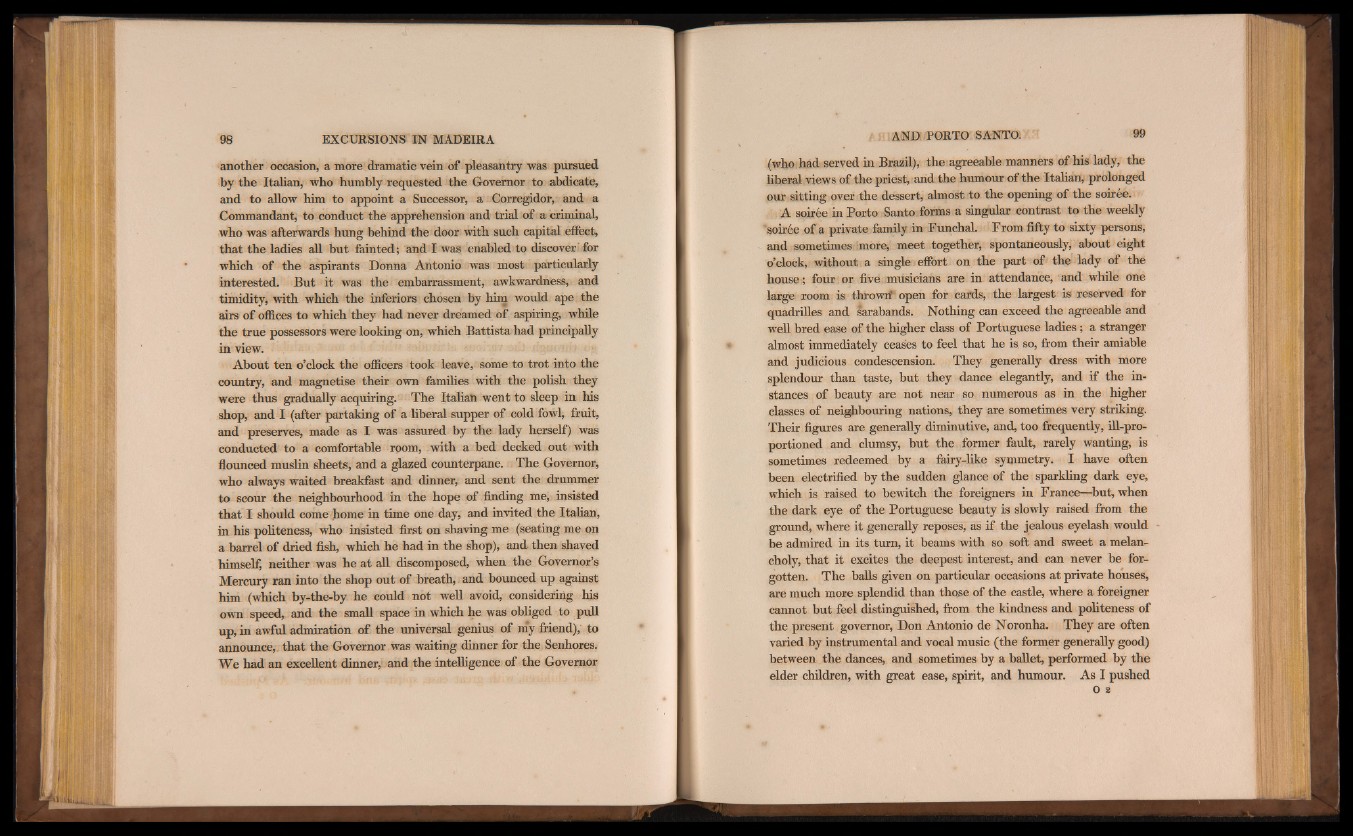
another occasion, a more dramatic vein of pleasantry was pursued
by the Italian, who humbly requested the Governor to abdicate,
and to allow him to appoint a Successor, a Corregidor, and a
Commandant, to conduct the apprehension and trial of a criminal,
who was afterwards hung behind the door with such capital effect,
that the ladies all but fainted; and I was enabled to discover for
which of the aspirants Donna Antonio was most: particularly
interested. But it was the embarrassment, awkwardness, and
timidity, with which the inferiors chosen by him would ape the
airs of offices to which they had never dreamed of aspiring, while
the true possessors were looking on, which Battista had principally
in view.
About ten o’clock the officers took leave, some to trot into the
country, and magnetise their own families with the polish they
were thus gradually acquiring. The Italian went to sleep in his
shop, and I (after partaking of a liberal supper of cold fowl, fruit,
and preserves, made as I was assured by the lady herself) was
conducted to a comfortable room, with a bed decked out with
flounced muslin sheets, and a glazed counterpane. The Governor,
who always waited breakfast and dinner, and sent the drummer
to scour the neighbourhood in the hope of finding me, insisted
that I should come home in time one day, and invited the Italian,
in his politeness, who insisted first on shaving me : (seating me on
a barrel of dried fish, which he had in the shop), and then shaved
hfmsplf, neither was he at all discomposed, when the Governor’s
Mercury ran into the shop out of breath, and bounced up against
him (which by-the-by he could not well avoid, considering his
own speed, and the small space in which he was obliged to pull
up, in awful admiration of the universal genius of my friend),' to
announce, that the Governor was waiting dinner for the Senhores.
We had an excellent dinner, and the intelligence of the Governor
(who had served in Brazil), the agreeable manners of his lady, the
liberal views of the priest, and the humour of the Italian, prolonged
our sitting over the dessert, almost to the opening of the soirée.
A soirée in Porto Santo forms a singular contrast to the weekly
'soirée of a private family in Funchal. From fifty to sixty persons,
and sometimes more, meet together, spontaneously, about eight
o’clock, without a single effort on the part of the lady of the
house ; four or five musicians are in attendance, and while One
large room is throwrf open for cards, the largest is reserved for
quadrilles and sarabands. Nothing can exceed the agreeable and
well bred ease of the higher class of Portuguese ladies ; a stranger
almost immediately ceases to feel that he is so, from their amiable
and judicious condescension. They generally dress with more
splendour than taste, but they dance elegantly, and if the instances
of beauty are not near so numerous as in the higher
classes of neighbouring nations, they are sometimes very striking.
Their figures are generally diminutive, and, too frequently, ill-proportioned
and clumsy, but the former fault, rarely wanting, is
sometimes redeemed by a fairy-like symmetry. I have often
been electrified by the sudden glance of the sparkling dark eye,
which is raised to bewitch the foreigners in France—but, when
the dark eye of the Portuguese beauty is slowly raised from the
ground, where it generally reposes, as if the jealous eyelash would
be admired in its turn, it beams with so soft and sweet a melancholy,
that it excites the deepest interest, and can never be forgotten.
The balls given on particular occasions at private houses,
are much more splendid than those of the castle, where a foreigner
cannot but feel distinguished, from the kindness and politeness of
the present governor, Don Antonio de Noronha. They are often
varied by instrumental and vocal music (the former generally good)
between the dances, and sometimes by a ballet, performed by the
elder children, with great ease, spirit, and humour. As I pushed
o 2